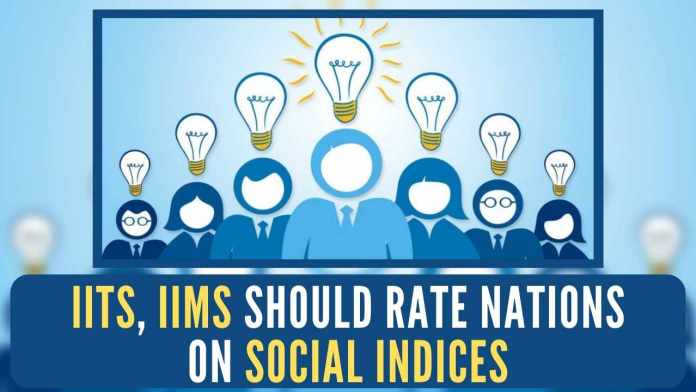
India suffers hugely due to such biased misrepresentations by Indian intellectuals
The biased, often anti-India, role of many of the outspoken intellectuals and teachers in Liberal Arts Departments (like History, Philosophy and Sociology) of Indian Universities and even intellectuals of Indian origin abroad (let me call them together intellectuals, for short) on the subject of ranking countries including India on various social indices like hunger, democracy, etc has been strongly questioned by Australia-based American sociologist Prof Salvatore Babones during his multiple interviews, starting with the one by Rajdeep Sardesai at the India Today Conclave.[1][2]
At last, an unbiased third-party professional has come forward to bell the cat. All such critiques of Salvatore Babones have been based on hard data, facts, and evidence, none subjective. He also declared unequivocally that he had no specific stakes or interests in India or the Indian government.
A stunned Rajdeep Sardesai said it requires a detailed debate, and Salvatore Babones accepted the offer for such a debate, but Rajdeep backed out.[3]
Salvatore Babones said foreign universities and NGOs use such biased reports and the opinions of these intellectuals substantially, unwittingly, or unwittingly, and create and publish indices of India on various topics (such as poverty, democracy, inequality, environment, peace, gender, universities, press freedom, corruption, human index, kids rights, etc) which makes the rankings significantly incorrect.
These indices and rankings are used as key inputs by global bodies like the UN, WHO, IMF, global investors, foreign governments, etc in their macro-level policy/ decision-making about India. In sum, India suffers hugely due to such biased misrepresentations by Indian intellectuals. Perception of India by the global opinion leaders and the general public also suffers, consequently.
Interestingly, he said even the very top decision-makers in governments worldwide including the US, know very little about India on their own due to their limited bandwidth and so, most of their perception and decisions are based on false opinions drummed up by the biased Indian intellectuals.
IITs, IIMs, and Science Departments of Universities are, by definition and in reality, objective. Professors in these institutions are not subjective like those in the liberal arts departments of global and Indian universities and people running most NGOs.
If IITs, IIMs, and Science Departments of renowned universities also start collecting data, researching, and publishing rankings of various countries, more particularly India, on all these topics like poverty, democracy, environment, press freedom, etc more objectively, without involvement/ interference of the governments, it will serve many purposes, as enunciated below.
- It will help the Indian Central and State governments understand really where we stand on all these indices, for their policymaking.
- It will help Indian citizens and PIOs understand where we stand for our objective assessment of our governments.
- It will help foreign universities and NGOs who publish rankings on similar indices verify how objective their own rankings are and make efforts to do course corrections if they are open enough.
- It will provide global bodies like the UN, WHO, IMF, global investors, foreign governments, etc another more objective set of data points in formulating their macro-level policy/ decision-making about India. They will find it difficult to make decisions about India solely based on biased reporting by Indian intellectuals as they have been doing so far, even if the reports of the IIMs, IITs, and Science Departments of Indian universities are not very popular yet, because of the highly credible standing of these institutions.
- It will make the biased Indian intellectuals realize that they can no longer create false narratives about India without being challenged, and hopefully make them mend their ways at least somewhat, as their personal credibility would be at stake.
- It will help the IITs, IIMs and universities build their brands among the global decision-makers and the people at large. The more honest, transparent, and objective these indices are, the higher will be the standings of these universities in global rankings, both perceptional and real.
Perhaps, professional bodies like CII, FICCI, NASSCOM, etc can take the initiative and urge their member companies to fund this effort. Funding as CSR activity is a possibility. This investment will pay off not only for the country at large but also for the Indian industry in particular.
Some may ask if this is the job of IITs, IIMs, and Science Departments of Universities. If the departments of liberal arts are creating false narratives and damaging the larger interests of the country, its people, and the Indian industry, should IITs and IIMs wash their hands off and watch it from the sidelines?
Note:
1. Text in Blue points to additional data on the topic.
2. The views expressed here are those of the author and do not necessarily represent or reflect the views of PGurus.
Reference:
[1] Intellectuals anti-India as class, not as individuals: Sociologist Salvatore Babones – Nov 5, 2022, India Today
[2] India’s declining rank in global indices due to ‘serious problems’ in methodology: Analysis – Nov 22, 2022, ToI
[3] Rajdeep Sardesai proposes debate with sociologist Salvatore Babones over his criticism of Indian intellectuals, then declines his invitation to debate – Nov 13, 2022, OpIndia
PGurus is now on Telegram. Click here to join our channel and stay updated with all the latest news and views
For all the latest updates, download PGurus App.
- Could Dr Subba Rao be wrong? Did GST rob the South? - September 18, 2025
- Property Aadhaar: A practical reform towards real estate transparency - September 17, 2025
- Reimagining Indian R&D for the AI age - September 16, 2025











Excellent suggestion